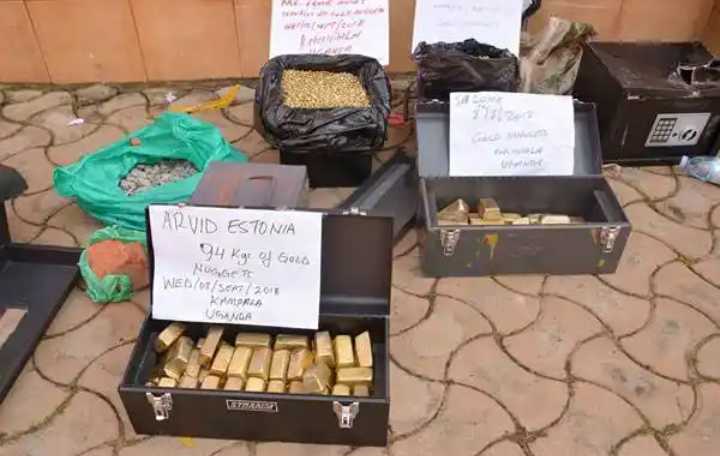An elaborate scam targeting a foreign businessman emerged in Kenya, resulting in the loss of over 2 million Euros.
The victim, Mr. Marco Colombo Conti, an Italian national, was lured into a fraudulent gold deal by individuals posing as legitimate gold sellers.
The scam began when Mr. Conti, a business associate of Mr. Satbinder Singh, traveled to Kenya with the intention of purchasing 100 kilograms of gold from a man named Mr. Allain Mwadia Nvita.
Mr. Conti initially paid around USD 400,000 in duty and other related charges through a law firm known as Squire AfriLaw Consult Limited.
This firm had a notorious reputation, having been previously involved in the controversial Kiwipay case.
In exchange for these payments, Mr. Conti was given 12 kilograms of gold, which the seller allowed him to carry as hand luggage to recoup his expenses.
However, when Mr. Conti was about to leave Kenya, the seller informed him that he could not take the gold as it was part of a larger consignment totaling 112 kilograms.
Instead, Mr. Conti was advised to store the gold in a secure vault at Mysafe Vaults located at Village Market in Gigiri, Nairobi.
Believing that the deal was still viable, Mr. Conti agreed and left Kenya, only to return on February 5, 2024, this time accompanied by Mr. Satbinder Singh, who was also interested in purchasing the gold.
Upon their return, Mr. Singh was introduced to a group that included the seller, Mr. Allain Mwadia, and several other individuals: Lehman John Raymond, Daniel Ogot of Patvad Trading Co. Ltd, and a Tanzanian agent named Frank Kateti.
The seller convinced them to purchase the entire 112 kilograms of gold, offering 31 kilograms upfront to cover the money Mr. Conti had already paid in 2022 and any future expenses.
On the same day, February 5, 2024, Mr. Ogot invoiced Mr. Singh’s company, Asianic Limited, for 162,240 Euros and 548,830 Euros, directing them to pay into an escrow account managed by Mosota Abunga & Associates Advocates, LLP, at Stanbic Bank.
Another invoice for 14,112 Euros was issued on February 7, 2024, for freight charges, all of which were paid by February 8, 2024.
The 31 kilograms of gold were then deposited into Mysafe Vaults, and on February 9, 2024, the foreign nationals collected the gold and had it divided and packed into sealed metallic boxes for transport.
However, as they prepared to leave for Jomo Kenyatta International Airport (JKIA), the clearing agents, Mr. Ogot and Mr. Kateti, failed to deliver the consignment and necessary documents as promised.
Suspicions arose when the scammers, now claiming a customs error had occurred, informed the victims that the consignment had been confiscated by customs officials due to a misdeclaration of weight, and their trading license had been suspended.
They demanded a hefty fine of USD 1,562,000 to release the gold. Mr. Singh, desperate to resolve the issue, flew back to Kenya and paid the amount through the same escrow account, not realizing that he was still being deceived.
At JKIA’s Forodha House, Mr. Singh met a woman named Susan Oketch, who falsely claimed to be a customs official and confirmed the legitimacy of the fine. She even provided some forged documentation.
After several months of false assurances and fake airway bills indicating that the gold was en route to Ireland, Mr. Singh became suspicious and contacted the Kenya Revenue Authority (KRA) to verify the authenticity of the documents.
The matter was escalated to the Directorate of Criminal Investigations (DCI), who uncovered that all documents were forged, the customs officials were imposters, and Patvad Trading Limited was not licensed to trade minerals.
Moreover, the airline confirmed that the airway bills were fake. In total, Mr. Singh and Mr. Conti had been defrauded of 2,168,258.91 Euros, equivalent to 341,949,292 Kenyan Shillings.
Three suspects have since been arraigned in court, and investigations into the conduct of the involved advocate are ongoing, with the case forwarded to the Office of the Director of Public Prosecutions (ODPP) for further action.





















Add Comment